Introduction
I have seen many people fall victim to Ponzi schemes without even realizing it.
Ponzi schemes are a form of investment scam that promises high returns with very little risk, at first.
Without a doubt, they have been around for over a century, and they continue to deceive people to this day.
In this article, I will explain exactly how Ponzi schemes work, the history behind them,
and how to protect yourself from falling victim to a Ponzi scam.
About Ponzi Schemes
A Ponzi scheme is a fraudulent investment operation where returns are paying to earlier investors by the capital from newer investors. The scheme relies on the constant recruitment of new investors to generate returns for earlier investors. The scheme’s name comes from Charles Ponzi, who became infamous for running a massive Ponzi scheme in the early 20th century.
Ponzi schemes are attractive to investors because they promise high returns with little to no risk. However, they are illegal and unsustainable. Eventually, the scheme will collapse when there are not enough new investors to generate returns for earlier investors.
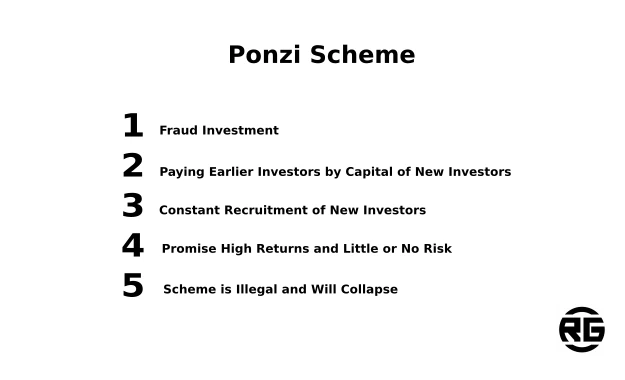
As you can see, the scheme of operation is not complicated at all. I would even say that it is trivial.
How Ponzi Schemes Work?
The mechanics of a Ponzi scheme are relatively simple. The scammer will offer investors high returns on their investment and will use the investment capital to pay returns to earlier investors. The returns will be paid out regularly, which will attract new investors who will believe that the scheme is legitimate.
The scammer will use a variety of tactics to attract new investors, such as offering referral bonuses, hosting lavish events, or using high-pressure sales tactics. The scammer will also claim to have a secret investment strategy or access to exclusive investment opportunities.
As the scheme continues, the scammer will use a portion of the investment capital to pay for personal expenses, such as a luxurious lifestyle or expensive vacations. Eventually, the scheme will collapse when there are not enough new investors to generate returns for earlier investors.
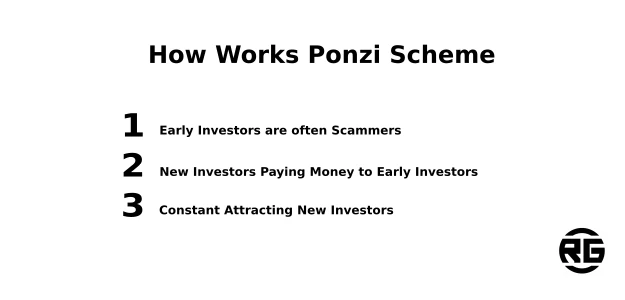
At its core, a Ponzi scheme is about getting new people to invest. This is the only way the scheme will not collapse.
The History of Ponzi Schemes
Ponzi schemes have been around for over a century. Charles Ponzi became infamous for running a massive Ponzi scheme in the early 20th century. He promised investors 50% returns in 45 days by exploiting the difference in the price of international postal reply coupons.
Ponzi’s scheme was eventually exposed, and he was arrested and sentenced to five years in prison. However, Ponzi schemes continue to be a problem to this day. In recent years, there have been high-profile Ponzi schemes, such as the Bernie Madoff scandal.
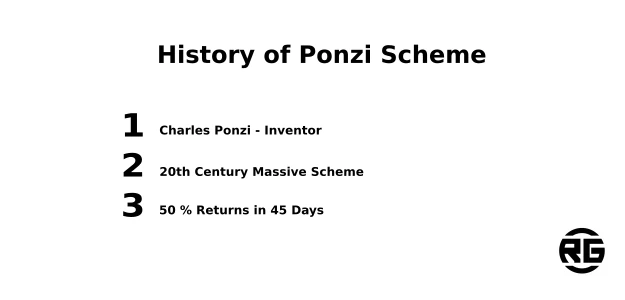
The Ponzi scheme originated with Charles Ponzi, which promised investors high rates of return in a short period of time.
Examples of Infamous Ponzi Schemes
The Bernie Madoff scandal is one of the most infamous Ponzi schemes in history. Madoff ran a Ponzi scheme for over two decades and defrauded investors out of billions of dollars. He promised investors high returns with little to no risk and used the investment capital to pay returns to earlier investors.
Another example of a Ponzi scheme is the TelexFree scam. TelexFree promised investors high returns for posting online ads for the company. However, the scheme was a Ponzi scheme, and the majority of the investors’ money was used to pay returns to earlier investors.
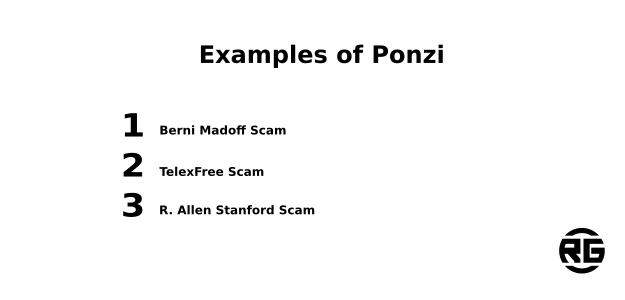
There have been several significant examples of Ponzi schemes in history. One of them was a scheme started by Charles Ponzi himself, ineed.
How to Identify a Ponzi Scheme ?
Indeed, there are several warning signs that a potential investment opportunity may be a Ponzi scheme. One of the most significant warning signs is the promise of high returns with little to no risk. If an investment opportunity seems too good to be true, it probably is.
Another warning sign is the lack of transparency. If the investment opportunity is not clear about how returns are generated, where the money is invested, or who is managing the investment, it may be a Ponzi scheme.
Finally, be wary of investment opportunities that use high-pressure sales tactics or promise guaranteed returns. Legitimate investment opportunities will never guarantee returns or use high-pressure sales tactics to recruit investors.
Read more about: FTX scam
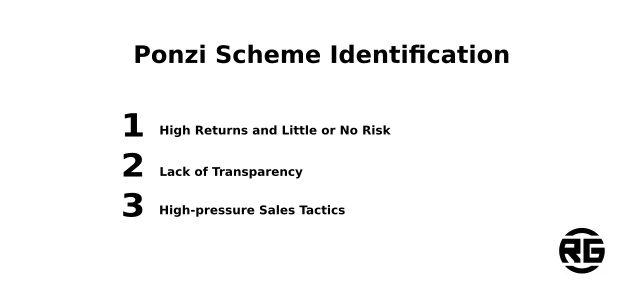
Psychology and sales techniques are responsible for the effectiveness of the Ponzi scheme.
The Psychology Behind Ponzi Schemes
Ponzi schemes work because they tap into our emotions and desires. The promise of high returns with little to no risk is incredibly attractive to investors. Additionally, the scammer will use a variety of tactics to create a sense of urgency or exclusivity, which can make investors feel like they are missing out on a once-in-a-lifetime opportunity.
The psychology behind Ponzi schemes is complex, and it can be challenging to resist the temptation of these schemes. However, the best way to protect yourself from victim to a Ponzi scheme is to be aware of the warning signs.
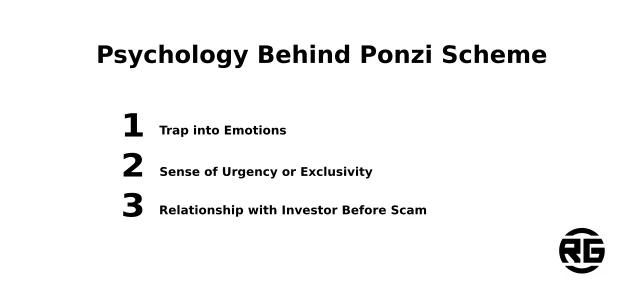
Our emotions in financial markets are our biggest opponents. Ponzi schemes also use them.
The Aftermath of Ponzi Schemes
The aftermath of a Ponzi scheme can be devastating for investors. When the scheme collapses, many investors will lose their life savings or retirement funds. Additionally, the legal proceedings can take years, and investors may only receive a fraction of their investment back, if at all.
The aftermath of a Ponzi scheme can also have a broader impact on the economy. The collapse of a significant Ponzi scheme can cause ripple effects throughout the financial system, and it can erode the public’s trust in the investment industry.
How to Avoid Ponzi Scams?
The best way to protect yourself from Ponzi scams is to be informed and aware of the warning signs. Before investing in any opportunity, do your research and ask questions. Legitimate investment opportunities will always be transparent about how returns are generated, where the money is invested, and who is managing the investment.
Additionally, be wary of investment opportunities that promise high returns with little to no risk. Remember that all investments carry some risk, and high returns usually come with high risk. Finally, be wary of investment opportunities that use high-pressure sales tactics or promise guaranteed returns.
Ponzi Schemes vs Pyramid Schemes
Ponzi schemes are often confused with pyramid schemes, but they are not the same. While both schemes rely on the recruitment of new investors to generate returns for earlier investors, there are some key differences.
In a Ponzi scheme, the scammer will use the investment capital to pay returns to earlier investors. In a pyramid scheme, the investor must recruit new investors to generate returns. Pyramid schemes are often disguised as multi-level marketing programs, but they are illegal and unsustainable.
Conclusion
In conclusion, Ponzi schemes are a form of investment scam that promises high returns with little to no risk. They have been around for over a century, and they continue to deceive people to this day. The best way to protect yourself from a Ponzi scam is to be informed and aware of the warning signs. Remember that all investments carry some risk, and high returns usually come with high risk. Do your research, ask questions, and be wary of investment opportunities that promise guaranteed returns or use high-pressure sales tactics.

Leave a Reply
You must be logged in to post a comment.